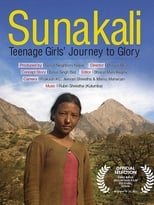Writer-Director Bhojraj Bhat is a journalist and filmmaker who assembled Sunakali without really knowing what the story was until he had accumulated a lot of footage. And so for the viewer, he unfolds the lives of girls in Mugu, a remote Himalayan district in Nepal, much as he might have discovered himself.
Life in Mugu is rural, simple, and poor. Only 37% of females can read and write; they are instead expected to do household chores, cook, and care for siblings. Most girls marry at age 16-19. Because parents assume their daughters will leave for another home someday, they don’t invest in the girls’ future. But the UN and other organizations like Good Neighbors International (GNI) see education as the tide that lifts all boats, and just like in the USA, sports are a way to keep kids in school.
Synopsis
Sunakali Budha and the other Mugu girls hang out together while gathering food and fodder in their baskets. GNI introduced them to football, and the girls have been kicking the ball around at altitude for 2-3 years, even without a soccer pitch. In Jan-2013, GNI organizes the G-football tournament for girls ages 12-16, and the girls are invited to represent Mugu.
It takes much convincing for the parents to consent, but the girls travel to Kailali, on the opposite side of Nepal, by plane, ox cart, motorcycle, and even on foot. Once there, striker Sunakali shines in the tournament and is heralded as the Himalayan Messi. When they return home, they are celebrated. The empowered girls and even their parents now see new possibilities for their lives.
Inspiration versus change
This documentary recently became streamable on Amazon Prime, and I assume that every time a new market opens for the 2014 film, Director Bhat and star Sunakali generate another dose of inspiration and a few more hours of fame. For example, in 2016 FIFA produced a video segment about Nepal that highlighted Sunakali’s performance. Certainly they and the Mugu girls deserve to be recognized.
But actual change in Mugu is hard to come by. As of 2016, Sunakali never got her chance to further develop a football career, although it appears she stayed in school longer than the average Mugu girl. GNI and other NGOs promoted the tournament and film as a success story that helps change the narrative on womens rights in rural Nepal. In 2018, Bhat helped a new Mugu team play in Spain, but his Rara film website is no longer operational.
A 2018 UN report covered issues in Nepal. “Gender-based violence, gender equality and women’s empowerment featured prominently in public discourses” that year. Says the report:
A combination of deeply embedded patriarchal norms, customary practices and common beliefs continue to affect women and girls’ health, livelihoods, life, dignity and personal integrity in Nepal. Harmful practices, such as child marriage, the dowry system, son preference, polygamy, widows, single women, women accused of witchcraft, and other practices, are entrenched in the society, in spite of criminalisation efforts of the Government and other improvements made in eliminating practices that promote gender inequality and violence.
United Nations Nepal – Strategic Summary 2018, pg. 8
One film can’t change all that
Of the many documentaries I have seen, Sunakali gets high marks for showing a slice of Nepali life we would never know about. In the FIFA video segment, the film is shown to Nepali students in Kathmandu, and they appear to be equally unaware of rural children’s lives in their own country.
Maybe it just helps for us all to believe that small events like this tournament or this film can change a single viewer or an entire village. In some ways, the effect on that village and even on Nepal may have been larger than any world cup or any Messi or Ronaldo. We can only hope.
Capturing the soccer play is pretty well done. I keep wondering where all those balls go when they fly over the edge of a village cliff.
8 Soccer Movie Mom Rating = 8
Resources:
- Released: 2014-12-11 (Kathmandu)
- In Nepali with English subtitles
- 59 minutes
- IMDB
- Writer-Director: Bhojraj Bhat
- Stars: Sunakali Budha (also spelled Sunkali)
- Watch the Trailer

